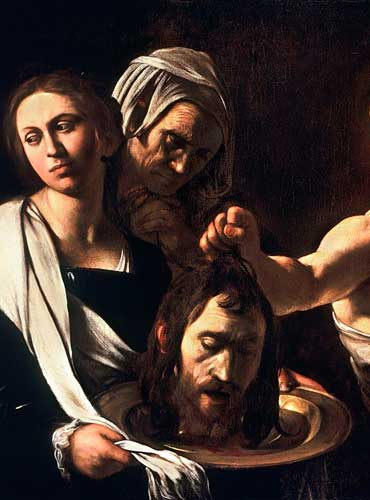Friday of the Fourth Week of Ordinary Time – Mk 6:14-29
Today’s Gospel recounts for us the death of John the Baptist. Mark’s Gospel gives us some profound insights into Herod’s character, insights that can help us to grow in our spiritual lives.
The context for the event is interesting: the people are talking about Jesus, and who He might be. Herod insists that He is John, come back from the dead, and then the evangelist proceed to tell us exactly how John died, as though the event wouldn’t have been mentioned had it not been for Herod’s worries. Herod speaks of the execution as a past event, but it’s clear it has just taken place, since Matthew’s account ends with Jesus’ disciples informing Him of what has happened, and Jesus leaving for a deserted area. On the surface, it seems like Herod is simply a blood-thirsty, heartless ruler. Yet, the Gospel points out in three different ways that his execution of John the Baptist deeply affected him and offered him a moment for conversion.
First, Herod’s admission that Jesus “is John whom I beheaded. He has been raised up,” is already a profound change. As a Sadducee, Herod didn’t believe in the resurrection; the events surrounding John’s death have made him re-consider. Secondly, in that same phrase, “It is John whom I beheaded,” there is an added emphasis on the subject; although the verb “beheaded” already implicitly contains the subject, Herod makes it explicit, as if to say: “I, I beheaded.” Herod recognizes his guilt, in the sense that he accepts that he is the one responsible for John’s death. Third, while in jail, Herod feared John, a strange situation considering that in prison, away from everyone, John was completely harmless. When the king asks for John’s head, Mark tells us that he is “deeply disturbed.” The Greek word here is literally “engulfed in sorrow.” It was a moment of profound anguish.
All of these details indicate that Herod was set up for conversion, that his conscience was awakening. However, in the end, he simply took a seat, and waited for Jesus to come to him. When that time came, Jesus didn’t say a word. Notice that Herod was given a ton of opportunities for conversion: John warned him, Herod felt fear, and then sorrow, and then worry. All of these things were gifts that God gave him to try to call him back. Yet, for Herod, these things never made him move beyond mere curiosity; he never concerned himself with the dirty work of conversion.
In our lives, too, God offers us opportunity after opportunity to purify ourselves from our attachments, from our desires, from our preferences and opinions. Day after day He calls to us. How do we respond? Are we even listening to the Lord, asking Him what He wants from us?
Today, let us ask for the grace, through the intercession of Mary, Mother of All Saints, for the grace of true conversion, to not simply stop when we are “ok,” but to really seek to do God’s will in everything and at all times.






